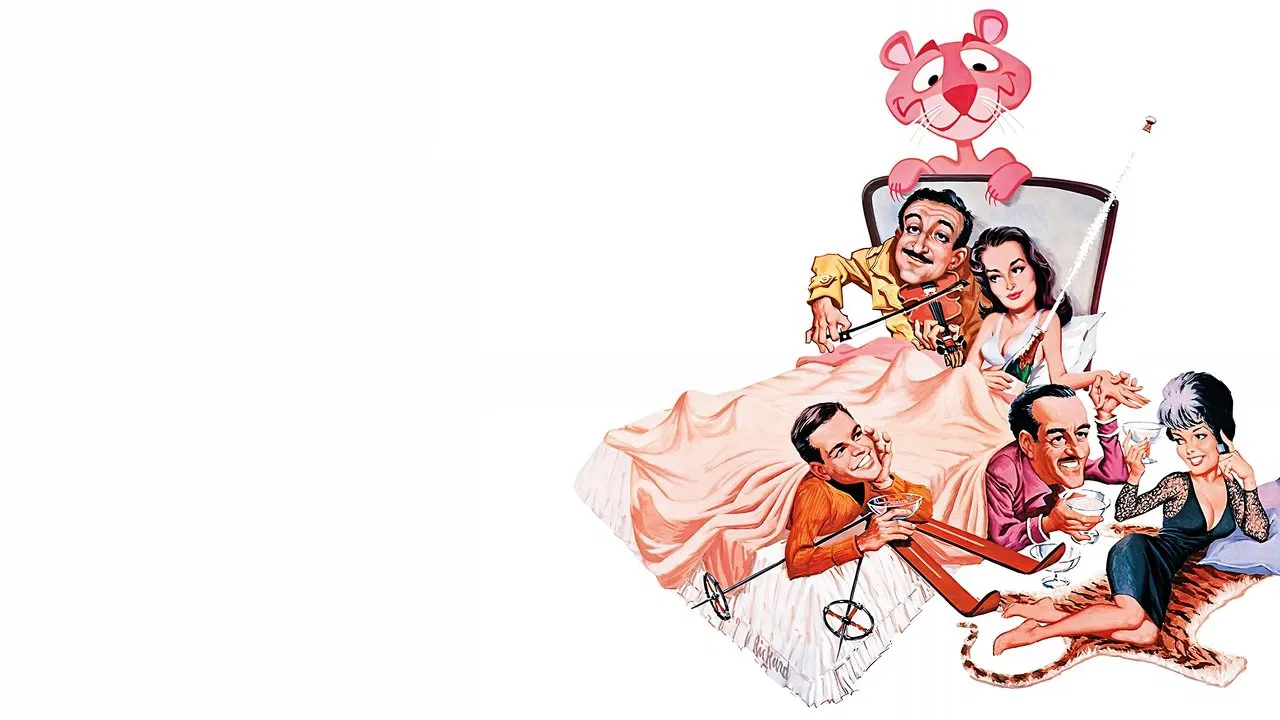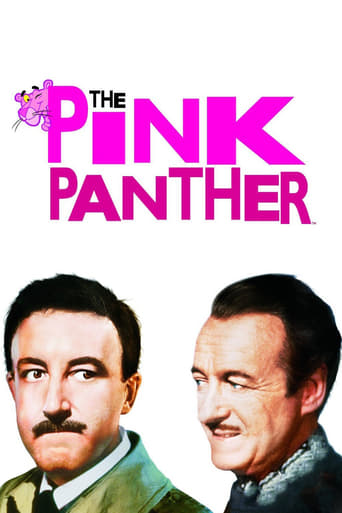Memorergi
good film but with many flaws
PiraBit
if their story seems completely bonkers, almost like a feverish work of fiction, you ain't heard nothing yet.
Ogosmith
Each character in this movie — down to the smallest one — is an individual rather than a type, prone to spontaneous changes of mood and sometimes amusing outbursts of pettiness or ill humor.
Sienna-Rose Mclaughlin
The movie really just wants to entertain people.
cricketbat
I spent most of the time rooting for the wrong character in The Pink Panther. I wanted Peter Sellers to be the protagonist and, instead, I got David Niven. This film isn't as funny as I had hoped it would be and it isn't very clever or original. Inspector Clouseau really is the best part of the story. I'm surprised that this film spawned a series of successful films and a beloved cartoon character.
lasttimeisaw
Blake Edwards' THE PINK PANTHER, which launches Peter Sellers' beloved character Inspector Jacques Clouseau onto the celluloid, is originally deemed a star vehicle for David Niven's Sir Charles Lytton, whose secret identity is a roué jewelry thief, aka, "The Phantom". Mr. Niven oozes an innate luster of urbanity tinged with bashfulness and innocuousness which is disarming and photogenic, women shall be enamored with him, and men would love to be him because his philandering mischief will hurt no one. Indeed, the script insouciantly glosses over its criminal technicalities in favoring of a goofy comedy upstaged by Mr. Sellers' comic tics, Inspector Clouseau is a bungling caricature, unwittingly two-timed by his wife Simone (Capucine), and conscientious to catch The Phantom before he lay claims to the titular diamond in possession of an Indian princess Dala (Cardinale, whisked to Hollywood in a race-insensitive role trading on her gorgeousness and she is quite a delight in capturing a whiff of tipsy feline bewitchment). Dawdling from a picturesque ski resort in Cortina d'Ampezzo to Princess Dala's imperial villa in Rome, where a masquerade is followed by a pyrotechnic commotion, the film is conspicuously light in its action (the only set piece is a midnight four-vehicle caper witnessed by an aloof old man in the square), but predominantly elicits laughter from its cartoony context, the most delectable one actually takes place in a bedroom which involves Simone painstakingly trying to hide two men from her husband, who feels frisky to assume their nightly amusement. Peter Sellers makes great play of Jacques' flat-footedness and unassuming persona to a sparking extent, its drollness would be further and maximally exploited in another Edward-Sellers comedy THE PARTY (1968), the mismatch of his unyielding physicality and dead-pan expression is a winning combo. A silk-stocking Capucine also relishes in her duplicitous flip-flopping with mild exasperation mingled with simmering gaiety, but Robert Wagner's George, the prodigal nephew of Charles, comes across as a drag vaunting his shallow good-looking and brazen chivalry. Also, singer Fran Jeffries contributes a swooning MEGLIO STASERA (IT HAD BETTER BE TONIGHT) which is forever inscribed in one's cortex along with its ear-worm theme ditty, both penned by Henry Mancini.In toto, it is a comforting experience to see Blake Edawrds' THE PINK PATHER still holds its allure amazingly with its exquisite patina of sophistication and humor, unadulterated by vulgarity and snobbery - the pathology prevalent in modern-day studio comedy wheeled out from Hollywood, a blessing from the past.
Python Hyena
The Pink Panther (1963): Dir: Blake Edwards / Cast: Peter Sellers, David Nevin, Robert Wagner, Claudia Cardinale, Capucine: Hilarious detective story about the unordinary as Inspector Clouseau is summoned to catch a jewel thief known as the Phantom who will target the famous Pink Panther diamond. Director Blake Edwards is a genius with slapstick pratfalls and the sight jokes are on target. This is quite a different comedy from his masterful work in Breakfast at Tiffany's. Peter Sellers plays Clouseau as someone so sure of what is so wrong but one wonders whether justice was served in the conclusion. His wife is involved with the Phantom, which plays just out of plain view. David Niven plays the Phantom who sadistically dazzles the Princess and outsmarts common sense. Claudia Cardinale plays Princess Dala who may or may not be what she seems. Robert Wagner steals scenes as Nevin's nephew that realizing that his uncle is the Phantom. Of course, he too sets his sights on the jewel as well. Capucine plays Clouseau's wife who is having an affair practically in front of him much to his unawareness to it all. Fine slapstick viewing marred by a rather corrupt conclusion but that will not hinder the humour. The winter setting provide great visual appeal and the art direction is superb. It is a pointless romp that would be known for an animated character. Score: 7 / 10
Red-Barracuda
Blake Edwards The Pink Panther turned out to be the first in a series of movies that focused on the inept police detective Jacques Clouseau. But in this first instalment the formula is quite a different one to that used in the later films. The reason is simply that Clouseau is merely a support character here, with the top billing going to David Niven as the character The Phantom. In fact, Peter Sellers was relatively unknown internationally at this time and, at best, he shares billing with Claudia Cardinale as the princess, Robert Wagner as Niven's nephew and Capucine as his unfaithful criminal wife. But in the event he was so good in the role his character easily became the most popular aspect of the film and the subsequent sequels all focused on him. In truth, he gives a masterclass in comic timing here, both with regard to his lines and also his physical comedy. So this first film in this series now seems a little odd in that it marginalises the character that we now see as synonymous with the Pink Panther series.In some ways, I think having Sellers share screen time with other performers actually works in this film's favour. As his moments are less regular but more consistently good, while the other characters add more interest to the story overall. This ensemble aspect allows the film to work more successfully both as a crime caper and as a farce, while the more glamorous aspects of the story-line are allowed to flourish more too. For some people, the best in the series is the immediate sequel A Shot in the Dark (1964), but for me its this first installment where the series peaked. It has more rounded characters and less absurd comedy and this, for me, makes it a preferable experience overall. It additionally benefits a lot from its early 60's continental stylishness. The Italian Alps make for a glamorous setting and any film featuring the likes of Cardinale is always going to invoke a certain dolce vita and va va voom. Adding to the overall gloss, is a justifiably famous easy listening score from Henry Mancini which of course would go on to be associated with those – still quite hilarious – cartoons featuring the one and only Pink Panther – who also makes his debut here in the opening credits. Of course, the Pink Panther in the film itself is no more than a McGuffin - a gem worth millions of pounds which sets into motion a crime caper about suave thieves, glamorous women and bumbling law enforcers. It additionally operates as a farce too, with one extremely well-timed comic sequence involving four characters in a hotel room being particularly great. One of my favourite moments though isn't a comic one, it's the section where for no real reason a slinky female singer calls a halt to proceedings and delivers a bit of early 60's Italo-pop, namely a lovely ditty entitled 'Meglio Stasera'. Bella, bella!Interestingly, things wrap up ultimately with what can only be described as a slightly odd ending. Expected Hollywood morality doesn't really pan out here as it does in the vast majority of movies, with criminal activity not necessarily being punished. It's a strange way to end the story but it couldn't be accused of being a predictable finale at least. On the whole, I think this is one of the great 60's films, its combination of still funny comedy, high glamour and general stylishness is for me a fabulous concoction.

